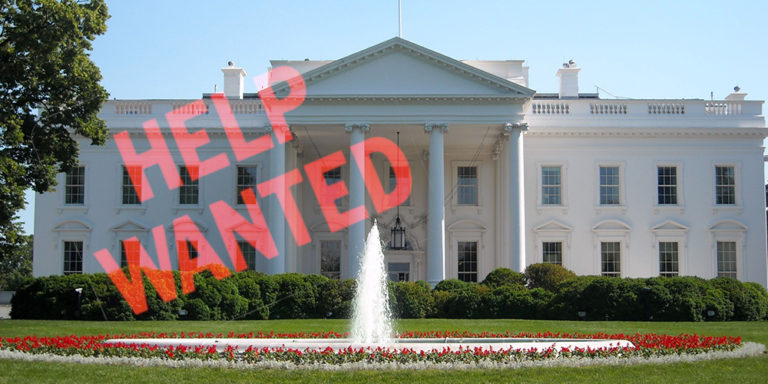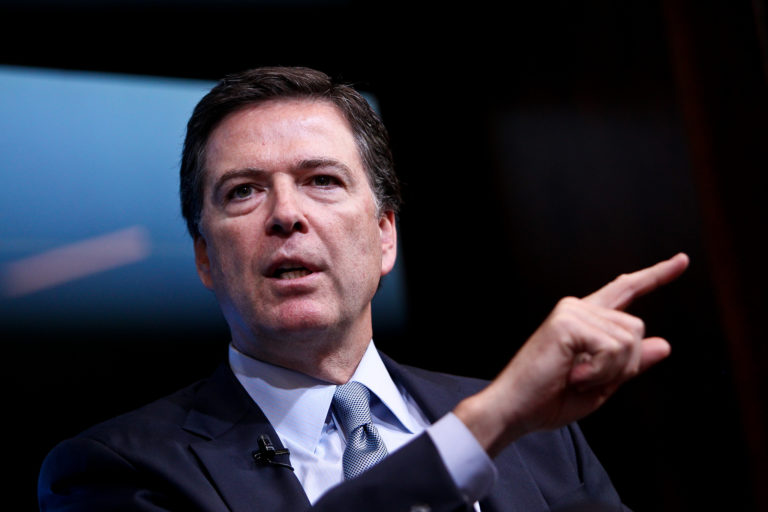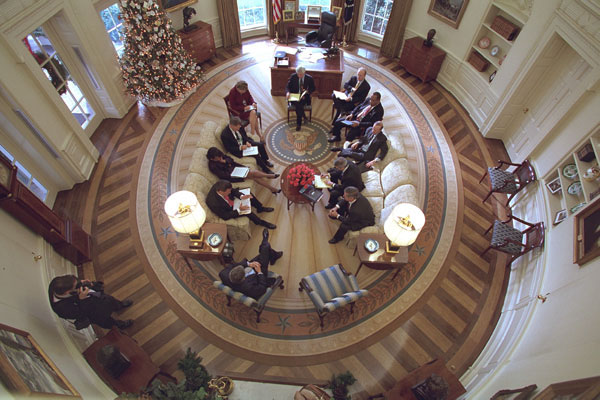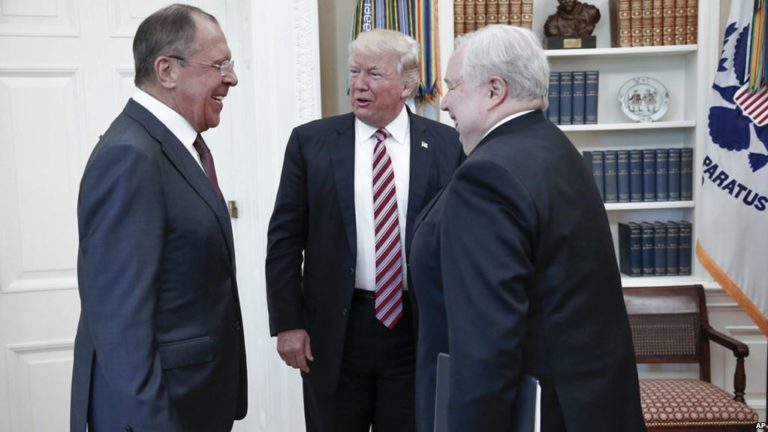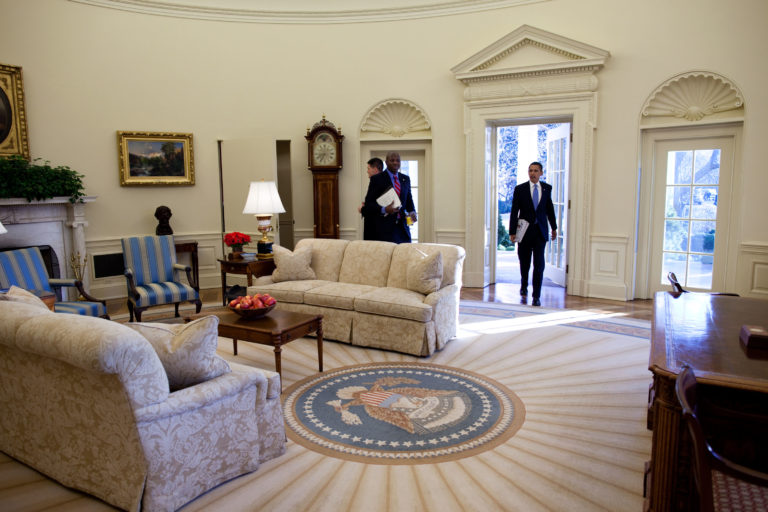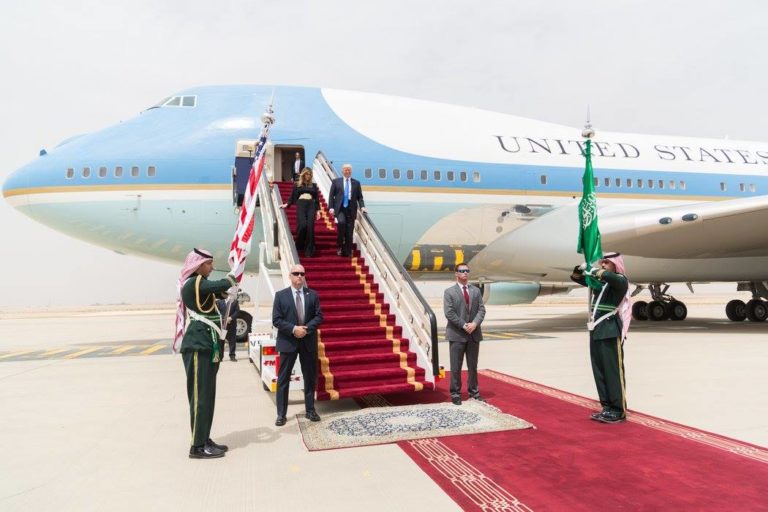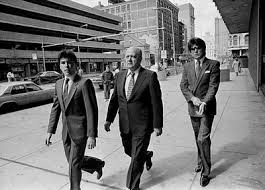Is The Trump-Russia Connection a Conspiracy, Or Inexperience?
What to Expect from Former FBI Director James Comey’s Testimony
it is unlikely that Mr. Comey will reveal anything new that might signal where the Russia probe, now being led by former FBI Director Robert Muller, is going. Rather, Mr. Comey will address a series of awkward interactions with President Trump seemingly aimed at persuading Mr. Comey to curtail the FBI’s Russia probe. Those conversations, which Mr. Comey memorialized in a series of memos to the file, have raised questions about whether Mr. Trump abused the power of his office to derail the FBI’s investigation. When Mr. Mueller was named as special council, the Justice Department authorized him to look into whether Mr. Trump broke any laws. Mr. Comey intends to simply report the facts Thursday and leave the legal judgements to Mr. Muller and others.“…I discussed with the FBI’s leadership team whether I should be prepared to assure President-Elect Trump that we were not investigating him personally. That was true; we did not have an open counter-intelligence case on him. We agreed I should do so if circumstances warranted. During our one-on-one meeting at Trump Tower,based on President-Elect Trump’s reaction to the briefing and without him directly asking the question, I offered that assurance.”
What we know
We do know that on several occasions over the past few months, Mr. Trump prodded Mr. Comey about the Russia investigation. News reports suggest that Mr. Comey grew increasingly disturbed about what he perceived as an attempt by Mr. Trump to pressure him. During a dinner with Mr. Comey early in his Presidency, Mr. Trump reportedly asked Mr. Comey if he had his loyalty. Mr. Comey promised only his honesty. In an Oval Office meeting with Mr. Comey, Attorney General Jeff Sessions and other aides soon after National Security Advisor Michael Flynn resigned, the topic of the Russia investigation came up again. According to an account reportedly memorialized by Mr. Comey in a memo, Mr. Trump shooed everyone out of the room and, once alone with Mr. Comey, asked if he could move past the investigation into Flynn. “I hope you can see your way clear to letting this go, to letting Flynn go,” Trump said. “He is a good guy. I hope you can let this go.” According to a New York Times report, Mr. Comey grew concerned enough that he asked Attorney General Sessions to ensure that Mr. Comey was never alone in the room with Trump.Arms Length
The FBI occupies an odd political space. Independent by nature, the FBI walls itself off from the White House when it comes to politically sensitive investigations. While the FBI Director serves at the pleasure of the President, he doesn’t take orders from him when it comes to the conduct of investigations, certainly not ones involving the President’s own campaign. Mr. Trump’s overtures to Mr. Comey disregarded the traditional arms-length relationship between White House and FBI. On their own they don’t rise to the level of criminal obstruction of Justice, but the pattern of conversations fall into a grey area. What lawmakers want to ask Mr. Comey Thursday is whether there’s more to the story. Were there more forceful efforts on the part of Mr. Trump than has been previously reported. For example, did Mr. Trump suggest that Mr. Comey should stop investigating Russia or lose his job? There is no indication from what we know so far that this is the case. But, the Committee wants to question Mr. Comey so they can assess just how closely Mr. Trump walked up to that line. In a sign of the high-stakes nature of Thursday’s hearing, the White House considered invoking executive privilege in a bid to prevent Mr. Comey from testifying. An extraordinary step that it probably didn’t have the power to take. It later rejected the idea. https://prodroughlyexp.wpengine.com/2017/06/2368/ Mr. Comey’s firing continues to be a rolling nightmare for the White House. Mr. Comey’s on the record accounting of events and the memos he wrote meticulously recording them Thurday could be a make or break moment for the White House. When a reporter asked Mr. Trump if he had anything to say to Mr. Comey in advance of the hearing, the President said simply, “I wish him luck.” https://prodroughlyexp.wpengine.com/2017/05/fallout-trumps-decision-fire-james-comey-explained/Trump, Comey and Executive Privilege Explained
The author is a former congressional investigator.
The Surprising Reason for the White House’s Oval-shaped Rooms
 The White House Historical Association explains how it worked in America.
The White House Historical Association explains how it worked in America.
The Oval Rooms of the White House Residence


The Most Famous Oval of All

Jared Kushner’s Role in the FBI’s Russia Probe Explained
A Series of Meetings at Heart of Investigation
Both NBC News and the Washington Post reported that the FBI is interested in a series of three meetings Kushner or his aides held with Kislyak and Gorkov. The first, held early last December, involved Kushner, Kislyak, fired National Security adviser Michael T. Flynn. It was held in New York, most likely at Trump Tower, and the discussion reportedly centered around U.S.-Russian relations, possibly to include American sanctions imposed on Russia. An aide to Kushner attended a second meeting with Kislyak. It is unclear what the subject of that meeting was. After the second Kislyak meeting, at the end of December, Kushner held a meeting with Gorkov.Different Accounts of Kushner-Gorkov Meeting
The Trump administration and Russian officials have given different accounts of the Gorkov meeting. A Veb spokesman said it merely was one of a series of that bank officials held with “the largest banks and business establishments of the United States, including Jared Kushner, the head of Kushner Companies.” A spokesman for Putin endorsed that view, saying the meeting with Gorkov “was ordinary [bank] business.” An unnamed White House official said Kushner attended the meeting with the Russian banker “in his capacity as a transition official in his role as a member of the Trump transition team.”Timing of Kushner-Gorkov Meeting Is Crucial
The timing of the Kushner meeting with Gorkov is critical. As Business Insider reported, it “. . . came as Kushner was trying to find investors for a Fifth Avenue office building in Manhattan that is set to be heavily financed by Anbang Insurance Group, a firm with ties to the Chinese government.” The Anbang deal fell through earlier this year. New York real estate insiders told Roughly Explained it was common knowledge within the industry that, at the time of his meeting with Gorkov, Kushner “was shopping around” for a source of funds that would help his family bail out 666 Fifth Avenue, the firm’s planned flagship building that had been losing money since at least 2008. After The New York Times first reported on the Kushner-Gorkov meeting, a White House White House spokeswoman said “the Kushner Tower” project wasn’t discussed during the meeting.How Did Gorkov Know Kushner Needed Money?
Here is the time-line that everyone agrees upon: Kushner met with Kislyak; there was a follow-up meeting between a Kushner representative and the ambassador; then Kushner has a meeting with the Russian banker. The Russians are not known for their veracity. But, for the moment, let us assume that the Veb and Putin spokesmen are telling the truth – the meeting between Kushner and Gorkov merely involved financial matters. Current and former government investigators have said the circumstances that surround the meeting between Kushner and Gorkov raise major red flags. The investigators all have the same question: How did Gorkov know the Kushner family needed money for their Fifth Avenue building? One possible way is that Kushner or someone close to him mentioned it to Kislyak. Another is that one of the many Russian real estate developers with whom Trump has done business knew about it, and passed it on. Or an unknown third party either could have passed it on, or have been a Russian agent (willingly or not). We do not know. But, it’s likely a question Special Counsel Robert S. Mueller will be looking to answer.The author is a former Congressional investigator.
How to Prank an Email Scammer
It started with an email…
Dear sir — I am a prominent investor who would like to invest in your country… If you have a good project plan that requires funding or looking forward for expansion of existing business, and you know you can handle such transaction, get back to me with your ideas for feasibility study. Looking forward for possible business collaboration. — Best Regards, Koneswaran.
Dear Koneswaran — I have an upcoming mining project that requires funding and looking for expansion. Let me know if you would like to collaborate on a feasibility study.Best Regards, Dave
Dear Mr. Dave — Thanks for your response and your high level business proposal is very nice and sensibility.what will be the requirements and estimated cost? Best Regards, Koneswaran.
Thank you for your savvy business sense to contact me about this.
Dear Koneswaren — I am seeking investors for a diamond mine in the United States. We are currently mining with a pick ax and small tractor but we are seeking a $100,000 investment for a bulldozer, buckets and other mining equipment. We have already discovered 12 great diamonds. If we can secure an investment, we feel that our mine will be among the greatest of all time.Thank you for your savvy business sense to contact me about this. Best Regards, Dave

Dear Mr. Dave –– I am so glad that you have discovered 12 great Diamonds, i suggest that we should secure an investment deal to expand the mining sector. i budgeted over $137,000,000 for projects. I have a joint venture in Malaysia with a Malaysian, a palm plantation and processing plant. And i also invested into some other areas such as tourism and real estate. I am Norwegian. I also work with United Nation… But you have to promise me your confidentiality in the transaction and you have to prove your stands and capacity to handle the funds once i transfer it to your account. i suggest we should have a round table meeting. Sincerely, Koneswaran.
Together we intend to take over the U.S. diamond market
…we plan to appear on the American television series “Shark Tank” and secure an investment deal with Mark Cuban.
Hi Koneswaran — I can tell that you are a great business negotiator. You will be a perfect partner in our mining endeavor. I have included my business partner, CP on this email. He is also an investor in the mining business. He is very good with the pick ax and has been assisting me with the tractor. Together we intend to take over the U.S. diamond market within the next two years.
With your investment we can expedite this process and control the world diamond economy with the next year. With $100,000 we can quickly expand our current mine. With $134,500,000 we can open a mine in each of the U.S. states and quickly expand and open diamond kiosks in every major city.
After this, we plan to appear on the American television series “Shark Tank” and secure an investment deal with Mark Cuban. From here we plan to overtake De Beers and quickly put them out of business with our discount diamond collection.
Each Diamond with be sold for 25% off and we will offer a buy two, get one free special on every major holiday. I assume with you business expertise, you can see the high potential with this plan. Please let me know how you would like to proceed. I am anxious for our round table meeting. Sincerely, Dave
Dear Mr. Dave, I want to thank you for giving me the opportunity to partner with you and meet with you for further discussion on our partnership. I have to reiterate that my position remain the same regards the financial position. I will appreciate if you will make all our discussion and transaction confidential due to my position as a public servant, you must agree with me that as a public servant I have limitation therefore i want to confide in you . The $134,500,000 for the project will be made available to you after the meeting with my representatives. My enthusiasm for the interest to work with you were greatly strengthened as a result your commitment to meet. I am confident that we will have a smooth partnership. The money will be transferred to your account after the meeting with my representatives. Best Regards, Koneswaran.
Tragedy strikes
Dear Koneswaran, I have very bad news! Our business partner CP is currently trapped in the mine. It collapsed on him while he was uncovering a large bed of rubies deep underground. I am very worried as he has no food or water. I have been up all night with the rescue team. Attached is a photo of the current situation here at the mine. Please pray for him. It would be very hard to find another miner as great as CP. Do you have any resources with the United Nations that could help us with the rescue? In Mourning, Dave
Dear Dave, It’s a very sad news, i pray he will be alive and safe. Please always keep me update for the latest development on the mining site. And also i will like to have your phone number.
Dear Koneswaran, I have a very troubling update for you. Our good friend CP is dead. His head was mutilated by a flying boulder. The mood is very somber here at the mine. I have attached photo of him being carried away. I thank you for being my closest friend during this terrible tragedy. CP was a great miner, but together we will endure this horrible time and move forward to overtake the world’s diamond business.
Now it is just the two of us. We will split the business 50/50. You will handle the investing, email marketing, and PR. I will take care of the mining, door-to-door sales, and accounting. Together we will be an unstoppable team. Are you available for a Skype video chat to discuss our flourishing business? Optimistically, Dave
Dear Mr. Dave, I am so troubled and saddened with the news you sent to me which i am not expecting. CP has come and gone, GOD you brought him to us and you took him back to be in a special place you prepared for him………… MAY HIS SOUL REST IN PERFECT PEACE, AMEN. Sincerely, Koneswaran.Love is in the air

Dear Koneswaran, Thank you for your prayers and your sympathy. You are a wonderful lover.
 My Dearest Koneswaran, The funeral was a bitter and lonely time without you. You can see that I decorated my car to pay tribute to the greatest miner who ever lived.
CP’s family is very grateful for the diamond that we presented to them. They are impoverished and have lost their home. Our act of kindness will allow them to pay for the funeral expenses. I realized through this experience that special friends like you and CP are very hard to find.
Koneswaran, you are my dearest love. I believe we have a special bond between us that cannot be broken. Our love and our diamond business will survive any tragedy. Please call me as soon as possible. CP’s pick ax was broken in the mine and we need to discuss replacement options. Yours Forever, Dave
My Dearest Koneswaran, The funeral was a bitter and lonely time without you. You can see that I decorated my car to pay tribute to the greatest miner who ever lived.
CP’s family is very grateful for the diamond that we presented to them. They are impoverished and have lost their home. Our act of kindness will allow them to pay for the funeral expenses. I realized through this experience that special friends like you and CP are very hard to find.
Koneswaran, you are my dearest love. I believe we have a special bond between us that cannot be broken. Our love and our diamond business will survive any tragedy. Please call me as soon as possible. CP’s pick ax was broken in the mine and we need to discuss replacement options. Yours Forever, Dave
The ‘Roundtable’ Meeting
The final message
After weeks of absurdity, the scammer finally realizes he’s been played. Koneswaran’s final message.Editors Note: No miners were actually harmed in making this prank. CP is alive and well.
Did Obama or Bush, like Trump, ever meet with Russians in the Oval Office?
Originally published on Quora.com.
Every modern President has met with Russian officials. Presidents Obama and Bush have both met with the very same Russian official Trump did, Foreign Minister Sergei Lavrov — and they met with others as well.
The fact that President Trump met with Russian officials is not at all unusual. Rather, what has people worked up is the circumstances surrounding the meeting — amid an investigation of Russian interference in the election on Trump’s behalf, possible collusion between Trump and Russia related to it, and allegations that Trump shared classified information with the Russian officials during the meeting.
Here’s President Obama with Russian Foreign Minister Sergei Lavrov, the same Russian official Trump met with:
And here’s President Bush with Lavrov too:
Other Presidents have had similar meetings. Here’s President Clinton with Russian Special envoy Viktor Chernomyrdin:
And President Bush with Russian President Vladimir Putin himself:
Even at the height of the Cold War, meetings with Soviet officials were not unheard of. Here’s President Reagan with Soviet Leader Mikhail Gorbachev:
It’s important in the present swirl of outrage surrounding President Trump that we keep things in context. There’s nothing at all wrong with a U.S. President meeting with Russian leaders. But, never before has there been reason to suspect that a U.S. President might do so with anything other than our nation’s best interests at heart.
The suspicions around Trump and Russia are still only that. But they have nevertheless changed how Trump’s interactions with Russia will be viewed.
Are all conversations in the Oval Office recorded?
Conversations in the Oval Office are generally not recorded. However, notetakers may be present in important meetings, especially those with foreign leaders.
Presidents could choose to bug themselves if they like, but as Richard Nixon demonstrated for the ages, it’s not such a good idea. No one is infalliable. A complete record of every utterance of even the most virtuous president is bound to include something unflattering.
It also might have a chilling effect on the level of candor with which aides offer advice. Knowledge that their words are being recorded might cause a president’s advisors pause about offering advice the president might not want history to hear. The ability of a president’s staff to speak frankly is critical. When presidents are wrong, and they sometimes are, aides need to be able to tell them that without fear of tarnishing their legacy.
Originally posted as an answer on Quora.
As Trump Steps Onto World Stage, Republicans in Washington Fret
‘The Drips are Filling the Bucket’
The Russia investigation is grinding Trump’s agenda to a halt. Although few Republicans are saying so publicly, official Washington is racked with doubt. Trump’s political capital is now all but exhausted — frittered away on a series of unforced errors and miscalculations. After the firing of an FBI director investigating his own White House, suggestions that the President attempted to pressure him to pull his punches before doing so, and the apparent careless disclosure of classified material to Russian officials, it’s growing increasingly difficult to rationalize the White House’s problems as just the manufactured controversies of an admittedly hostile press corps. As one outside advisor to the White House told Axios’ Mike Allen in an email, “[t]he drips are filling the bucket.” Trump’s Republican allies, who just a few weeks ago were still dreaming of triumphs, would now settle for mere survival. With a special counsel now in place, the die is cast. Trump may yet be exonerated on the core accusation that he personally colluded with Russia in Moscow’s efforts to influence the 2016 elections. But, the suggestion that he may have pressured the investigation may hold new troubles. Further, it seems increasingly likely that the special counsel investigation led by former FBI Director Robert Mueller might uncover evidence of wrongdoing, if not by Trump himself, then by at least some people within Trump’s orbit. Still, all the breathless talk of impeachment is premature. President Trump remains popular among grassroots Republicans. His support has slipped a bit in the past week, but most of his voters are still sticking with him. While Trump’s troubles are making Congressional Republicans nervous, few will be willing to turn against him — but they aren’t go out of their way to defend him either. As sacked former FBI Director James Comey, prepares to testify on Capitol Hill and the special counsel investigation gains steam, that “supernatural” veil of protection White House advisors talk about will surely be put to the test.How White House Counsel Don McGahn’s Uncle Helped Trump Do a Deal with the Mob
Mobsters and Parking
The Trump Organization in 1982 began construction on Harrah’s at Trump Plaza, an Atlantic City casino that later became the Trump Plaza. While Trump had the casino site, he did not have a place to park customers’ cars. Trump was interested in two potential site that he wanted to turn into parking. In a book about Trump, investigative reporter Wayne Barrett, who died earlier this year, wrote that the site Trump eventually purchased was owned by two sons of organized crime figures: Salvatore “Salvie” Testa and Frank Narducci, Jr. They had paid $195,000 in 1977 for the property directly across the street from the Trump Plaza, and operated a nightclub on it. Testa’s father, Philip “Chicken Man” Testa, was killed by a bomb – an act that was immortalized in the Bruce Springsteen song “Atlantic City” (“Well they blew up the chicken man in Philly last night now they blew up his house too”). Barrett alleged that Testa “headed Nicodemo “Nicky” Scarfo’s hit-man squad called the Young Executioners.” FBI reports state the Scarfo crime family at the time “dominated Atlantic City and Philadelphia.” A Website about organized crime called Narducci Jr. a “Philly Wiseguy.” He was convicted of murder along with Scarfo and five other reported organized crime figures. Narducci’s father ironically was killed reportedly in retaliation for his role in the murder of Philip Testa.Patrick McGahn’s Role
New Jersey state investigative records show that Trump paid $1.1 million for the site, after the title was transferred from Testa and Narducci to Patrick McGahn’s secretary and then to a Trump entity. An investigative report on Trump’s license to operate Trump Plaza undertaken by the New Jersey Division of Gaming Enforcement states that Trump knew the property was owned by what the DGE called “Testa Group.” The DGE report states: “Because [Trump] did not want to negotiate with those people directly, he instructed his attorney, Patrick T. McGahn, Jr., to deal with a broker and arrange for a cash deal. With respect to the property in question, by deed dated July 11, 1977, Jeanne’s Enterprises transferred the property to Frank J. Narducci Jr. and Salvatore A. Testa. By deed dated April 1, 1982, Narducci conveyed his interest in the property to Testa.” The DGE reports that Trump “authorized McGahn to purchase the property . . . for such entity which [Trump] would thereafter designate in writing. [Trump] also requested that McGahn ensure that the property would be fully assignable.” Barrett alleged the other “entity” was McGahn’s secretary. The closing was held on November 4, 1982 in McGahn’s law office. The DGE report states that the people who attended the closing included McGahn, Testa and his lawyer, and Chris Scarfo – “the son of Nicodemo Scarfo.” The DGE notes: “The $1,100,000 purchase price of the property was paid in cash.”The author is a former Congressional investigator.

